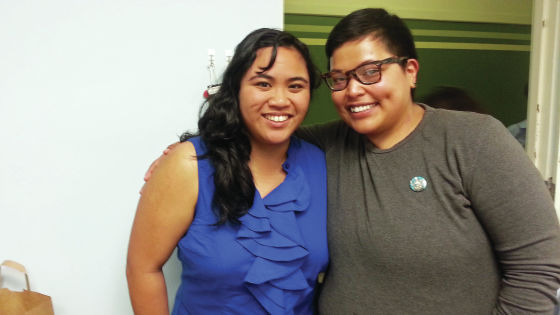Since 2008, the Chicago Dyke March Collective (CDMC) has held its annual march in locations outside the city’s traditional Andersonville neighborhood. The CDMC has also, in recent years, sought to engage communities by organizing forums on topics relevant to the area it marches in.

The Chicago Dyke March is in its second year of being hosted by the Uptown-Argyle neighborhood, home to a significant Asian and Asian-American population and several Asian-American businesses and social service organizations. To reflect issues close to the community’s history and present, the CDMC organizers organized a panel discussion titled, “Connecting the Dots: Immigration, Race, Sexuality and Community.”
The event was held at 4753 N. Broadway (the Bridgeway Bank Building), at the community space of the Asian American Center for Advancing Justice (formerly the Asian American Institute), an advocacy and lobbying organization, on the fifth floor.
Liz Thomson, one of the organizers, introduced the event and Emilia Chico provided a brief history of the nationwide DM movement and Chicago specifics. Vi Ray-Mazumdar, a Dyke March Collective member and staff member at the Center, moderated the remainder of the event with Thomson.
Ray-Mazumdar spoke about the reasons why this year’s forum was on immigration, pointing out that “immigration has been part of Asian-American history and present.” They (Ray-Mazumdar’s preferred pronoun) provided some parts of that history, explaining that Asians were prevented from gaining citizenship from 1882-1965, even though Asian immigrants literally built the infrastructure of the United States, as in the case of the Transcontinental railroad.
According to Ray-Mazumdar, Asians are the largest growing immigration group in the country. There are one million undocumented Asian Americans. Out of the four million immigrants experiencing a backlog in family-sponsored immigration, 2 million are of Asian origin.
Currently, the latest proposed comprehensive immigration reform (CIR) bill excludes provisions for sibling sponsorship and binational couples. This undercuts the goal of family reunification, a principle that’s been at the forefront of immigration rights advocates organizing for several years.
The event sought to unpack and demonstrate the complexity of LGBTQ immigrants in particular. A video and brief presentation by Vicki Tai touched upon themes of sexuality, gender and the concept of “home.”
Rossette Valladarez and Kristina Tendilla spoke of their lives and work as self-identified queer immigrants. Valladarez is a Dyke March Collective member, and said that “coming out as undocumented and queer was like coming out of two closets.”
She spoke of growing up undocumented and being isolated from friends after being told of her status by her mother, who also told her she couldn’t bring friends home or tell them of her situation.
Tendilla, from a Filipino-American family, described her organizing around issues like poverty and race. She also spoke of her personal understanding of the sponsorship backlog: Her father’s sponsorship of his siblings took over twenty years, and one of her uncles died during the process.
Both emphasized that they drew strength from the support networks of family and friends they’ve found through their work. Valladarez is putting herself through college at UIC. Tendilla, who works at Benton house, a settlement house community, draws upon her experiences and life to make connections between different the racial and economic communities in which she finds herself.
The discussion after the panel dwelled on the connections between immigration work in the United States and the current global crisis in immigration, the impact of socio-economic factors in determining immigrant access to resources like education and what some felt was the inability of mainstream groups like Human Rights Campaign to work with immigrants.
More information about the Chicago Dyke March and community events leading up to to it can be found at chicagodykemarch.wordpress.com or their Facebook page www.facebook.com/events/102132403327837/ .
Correction: “Rossette Valladarez is not a member of the Immigrant Youth Justice League, as previously stated. A member of CDMC wrote that although ‘she has done work for them and and spoke at their events in the past,’ she ‘broke ties with them before the forum.'”
Originally published in Windy City Times.
Photo of Rossette Valladarez and Kristina Tendilla provided by the collective/Liz Thomson.